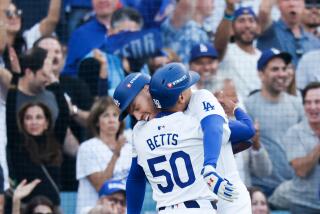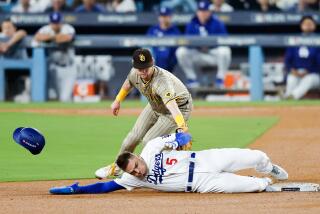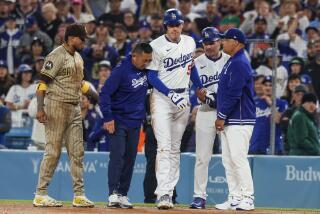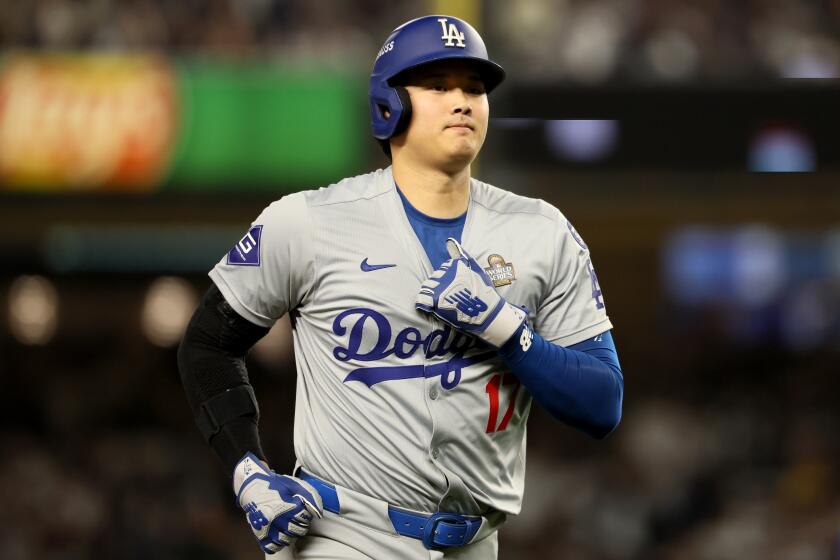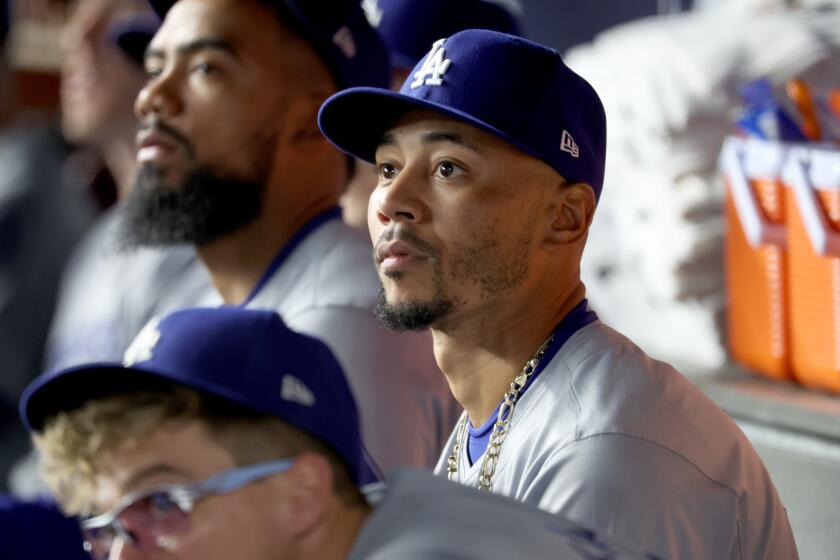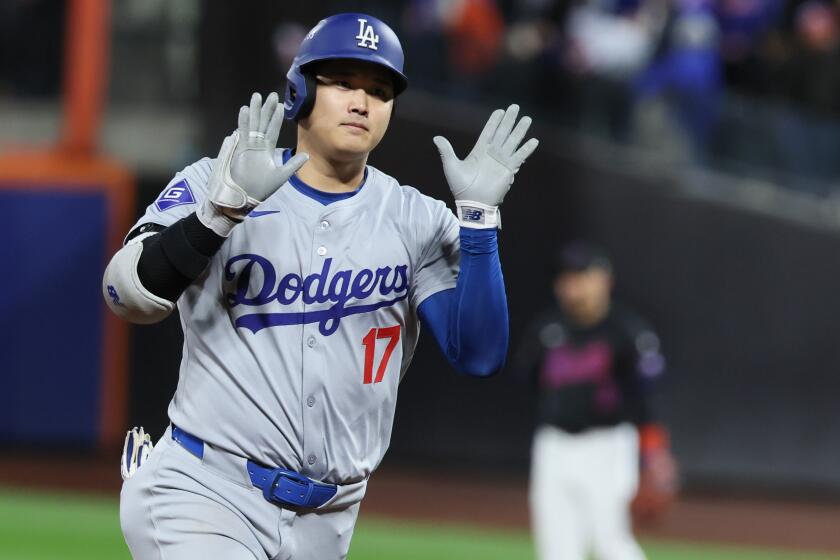WHO’S ON THIRD? NOT THEM : Now His Pride Is Hurt : Frustrated Hamilton Wants Full-Time Job Back
Before a recent game at Dodger Stadium, Jeff Hamilton was slowly rotating his left arm, wincing.
His face was red and glistening with beads of sweat. His blond hair was standing on end.
Too much batting practice? Too many pregame throws?
“No,” Hamilton said softly. “Too much speed bag.”
Hamilton had just returned from a room beneath the stands where a punching bag hangs from the ceiling.
He had been hitting the bag, over and over, for no other reason than he simply had to punch something .
“Sometimes, I just can’t take it,” he said. “Sometimes I think I am going to just blow up.”
The 1991 baseball season knocked Hamilton silly on opening day, and he has been staggering since.
Suddenly a platoon player at third base after a shoulder injury last season, Hamilton has become the object of sad looks in the clubhouse and abuse from the fans.
He hears the boos, he is told about the nasty phone calls to radio stations, he feels the stares from club officials when he steps onto the field.
And he doesn’t know how much more he can take.
“Fans used to just yell bad things about me, but now they are starting to talk about my family,” Hamilton said. “The other day a guy was yelling about my sister, asking how she’s doing, saying bad things about her. It was awful.
“They haven’t said anything about my wife, thank God, because if they ever did . . . “
When the 1990 season began, he was the Dodgers’ third baseman of the immediate future. He had been the starter for most of the previous two seasons, he was only 26, and the Dodgers liked him so much they refused to even discuss a trade for another third baseman.
A year later, it seems he has no future here. And his present is nearly unbearable.
“Every move, every step, I’m constantly under a microscope,” he said. “I have absolutely no margin of error. None.
“Everybody is ragging me, and all I want to know is, why? What did I do to hurt anybody? So I was injured for a year. Is that what I did?”
Hamilton has plenty of questions and there appears to be only one answer.
The Dodger must trade him if they can.
Hamilton won’t say it, but his agent, Alan Hendricks, gently suggested that to Fred Claire, Dodger vice president, during a recent conversation.
“I just told Fred that I feel, based on the events that have unfolded, it might be best if they moved Jeff along,” said Hendricks from his Houston office. “Like a lot of players, Jeff feeds off confidence, which he may or may not be getting there.
“I think everybody might be better served if Jeff was moved into a little more predictablesituation (somewhere he could start).”
Hendricks did not demand a trade, because he can’t, yet, under baseball’s basic agreement.
But after this season, when Hamilton has five years in with the team, he can force the club to trade him by March 15, 1992. That would cost Hamilton his free-agent rights for the next five years, but he might be ready to make that sacrifice.
“After this year--if I make it through this year--then I’ll have some rights that I can use,” Hamilton said. “And really, it wouldn’t kill me if I didn’t play here. Sometimes, maybe, change can be good for people.”
In his case, he said, the sooner the better.
“If they have lost confidence in me, I wish they could ship me the hell out of here,” he said. “And I mean it.”
Coming off a 1989 season in which he hit 12 homers and 35 doubles with 56 runs batted in, 1990 was supposed to be Hamilton’s season of stardom. But he was soon forgotten because his replacements, Lenny Harris and Mike Sharperson, were combining to bat .301. They gave the Dodgers the only “third baseman” in baseball who hit better than .300.
After intensive winter therapy, Hamilton declared himself sound and he could have retained the full-time starters’ job with a good spring because of his fielding skills and potential to hit both left- and right-handed pitching for power.
But he batted .266 in the spring, lower than either Harris at .393 or Sharperson at .278 and was generally unimpressive.
Manager Tom Lasorda decided to reward the left-handed hitting Harris for his fine 1990 season and turn third base into a platoon position.
Hamilton learned of that plan shortly before the Dodgers’ first game of the season, when Harris was put into the lineup against right-hander John Smoltz.
“I was stunned,” said Hamilton, who entered the season with a .235 career batting average. “I am sure that one day I can be a bench player--look at Dave Anderson (of the San Francisco Giants), he has made a great living at it. But I am just not ready for that yet.”
After 19 games, nobody is thriving at third for the Dodgers. In eight starts, Hamilton is batting .212, with one double and four RBIs. In 10 starts, Harris is batting .257 with no extra-base hits and three RBIs.
And Sharperson, who has started games everywhere in the infield except third base, is batting .172.
Some in the organization believe that the Dodgers should return to the Harris-Sharperson platoon. Others figure they should trade for an everyday third baseman.
But Claire said he is not giving up on Hamilton.
“Two things have happened to Jeff,” Claire said. “He is faced with competition from fellows who played very well when he was hurt last year. And in even a larger problem, he has gone through a year without seeing much major league pitching.
“Will Jeff play more? With all the left-handers we will surely be seeing, I think he will. And the role he has now may not be the role he has for the next six months. Everything is always changing.”
Said Lasorda: “Jeff has a lot of ability. He has shown that in past years. We just hope he can reproduce it.”
Hamilton just hopes he can survive the next day. And the next.
Even his claims to fame, no matter how slight, are being stripped from him this season.
For instance, he began the year as the player with the most at-bats without a stolen base--he has attempted only three. But Cecil Fielder of Detroit passed him Monday night, having gone 1,147 at-bats without a steal to Hamilton’s 1,144.
“Shoot, now I won’t be able to hold any records,” Hamilton said, grinning.
But when the tension becomes thick, and there are no punching bags in sight, Hamilton thinks of Kyle, his only son, who is not yet 2 but already weighs 35 pounds.
Kyle has a tiny baseball glove. And a tiny bat. And a tiny pitching machine that Hamilton sets up in his house.
“If my boy wants to become a ballplayer, I am going to do everything I can to make sure he is the best he can be,” Hamilton said. “Maybe that way, he will never have to go through what I am going through now.”
More to Read
Are you a true-blue fan?
Get our Dodgers Dugout newsletter for insights, news and much more.
You may occasionally receive promotional content from the Los Angeles Times.
